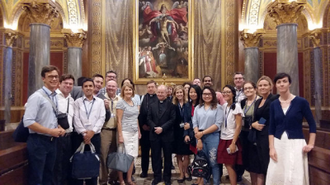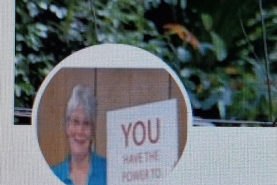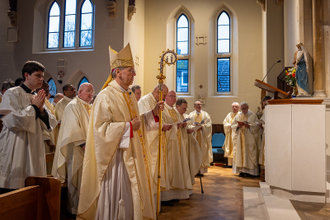Rome: The Church Up Close - Day 5

Walking on Rome's cobbled streets requires shoes with shock absorbers, such as trainers. At least that is my view. Catholic journalists from 16 countries - including the Head of Communications of the Catholic Diocese of Oslo in Norway, the Editor of the Catholic newspaper of Biloxi Diocese in the United States and a representative of the media office of the Catholic Bishops Conference of the Philippines - have walked more than 10,000 steps every day during our week-long 'Church Up Close' course. One of us is measuring them! Yet walking brings many delights. The pretty streets with small fountains and many street shrines, lined with warm terracotta buildings, offer café stops and the chance to call into some of Rome's many churches.
This morning Jo Siedlecka of Independent Catholic News and myself headed off for a mile walk to a session at Rome's English College, a Catholic seminary. It meant negotiating heavy rush hour traffic - especially dodging mopeds - but also involved a tranquil walk in the summer sunshine by the River Tiber. Mature plane trees are a feast along the Tiber, their rustling leaves reaching out to the water.
At the English College, hidden away in a side street near Piazza Farnese, we received a warm welcome at the door from Rector Mgr Philip Whitmore. He brought us down to the crypt for a presentation. There were fragments of an ancient Roman pavement beside where we were sitting and the long history of the English College was explained to us. It was originally founded in the 14th century as a hospice for English pilgrims. The seminary was founded in 1576 - 44 students went on to be martyred for their Catholic faith in England between 1581 and 1679, as well as 130 who suffered imprisonment and exile. 'The Martyrs' Picture' in the chapel shows blood from Christ's wounds falling onto a map of the British Isles. During those dangerous years, each time news reached Rome that another priest had been executed in England, students would gather round the painting and sing the Te Deum. This custom continues today when the Te Deum is sung in front of the painting on Martyrs' Day, 1st December, and relics of the martyrs are venerated by the students. Forty priests from the English College have been canonised or beatified by the Church.
The college currently has 29 seminarians, largely drawn from the dioceses of England and Wales, and their training focuses on the following formation: Spiritual, Intellectual, Human, and Pastoral. We learnt that Canon Law requires that seminarians must spend two years studying Philosophy and four years of Theology - academic courses which they take at Rome's Pontifical universities.
They also acquire such skills as celebrating Mass, preaching, baptising babies, hearing confessions. We learnt - in response to questions - that they do not, however, receive much formation in the Social Teaching of the Church. Although women are involved in delivering elements of pastoral courses, their role "could be amplified". There was discussion about how clericalism is addressed in seminary training, with journalists from three continents reporting that younger priests tend to be less aligned to the post Vatican II Church than older ones.
Back at the Holy Cross University we had a raw session on 'The Church's response to Sexual Abuse' from Fr Hans Zollner SJ, President of the Gregorian University's Centre for Child Protection and a member of the Pontifical Commission for the Protection of Minors.
Waves of abuse stories have been met with "disgust", "anger" and "depression" by Catholics - as well as the wider world - and it cannot be avoided anymore. Pope Francis is being called upon to "do something". Many Catholic journalists on our course have had to cover the issue and they raised questions about more transparency, that safeguarding policies be implemented, and that the Church has more focus on victims.
"The impression is that the hierarchy just don't get it" and "we produce papers but who does follow up?" seemed to be common threads, and "safeguarding needs to be an integral part of mission". Few dioceses have put this issue at the top of their formation programmes. Is the Church being scapegoated for a problem which is huge throughout society? To some extent, but the Church has attracted particular attention because it regards itself and is regarded as a moral authority.


















